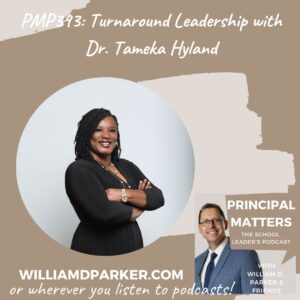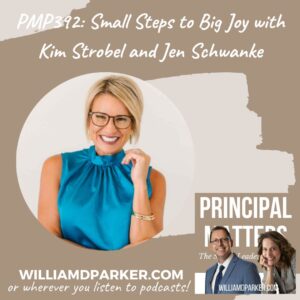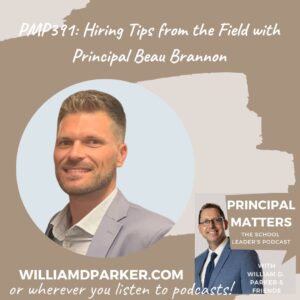Podcast: Play in new window | Download
Although it is so important to understand your “why” in leadership, it is also imperative to understand “how” to effectively do your work.
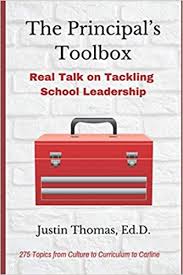
This week’s guest, Dr. Justin Thomas, provides practical feedback from his years as an elementary principal with several takeaways from his new book, A Principal’s Toolbox: Real Talk on Tackling School Leadership (2020).
The Principal’s Toolbox is an honest look at many of the practical aspects of the principalship. In our conversation, we discuss what motivated him to write The Principal’s Toolbox, how the book is different from others that are available to school leaders, and key takeaways from his 200+ practical topics for principals.
Meet Justin Thomas
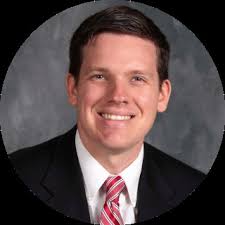
Justin Thomas, Ed.D., is an elementary school principal serving students, faculty, and community near Nashville, TN. Prior to his work in school administration, he enjoyed 8 years as a middle school and high school band director. During his 6-year tenure as principal of Nannie Berry Elementary, his school team has been recognized multiple times by the Tennessee Department of Education for outstanding student growth and achievement gap closure. Dr. Thomas and his wife Susan enjoy their busy life with 3 daughters in Nashville.
Here are a few questions we unpack together:
WDP: Can you talk to us about why you teach about the importance of “Feedback from Non-teaching Faculty”?
Justin: Whether it is teacher’s assistance, office staff, custodians, or front office staff – these are people whose direct influence on students is so important. Often, they have a very global perspective on how things are going around school. Ask them for feedback. Listen to their perspective on what parents think about your school, how your messaging is perceived by community, and what experiences others have when visiting your school.
WDP: You also have a chapter on “Things That Aren’t Your Thing Are Your Thing.” Can you explain what that means?
Justin: There is no way to escape your own competence with what your school really needs. You may not know much about changing light bulbs, but you may need to learn how it’s done. Paying attention to the quality of your building’s cleanliness, guiding consistency in instructional standards – these may not be areas you consider your expertise, but you must now learn to care about them.
WDP: I so agree. Even at the secondary level, you must make student activities ‘your thing’ as well. This applies academically as well. You may not have been a core content teacher, for instance, but you can still identify and guide effective instruction.
Next question: Why do you have a chapter called the “The Booger Test”?
Justin: I thought you’d ask that question! If your best friend had a booger hanging from his nose, wouldn’t you tell him? Why aren’t we willing to apply the same lesson to our teachers? It may be uncomfortable to provide critical feedback, but if you do it out of love and care, they will appreciate you helping them grow. If someone has the power to change a practice, offer them suggestions how. If it is not within their control, then don’t mention it.
WDP: In your book, you say you, “…believe that the keys to success revolve around growth and gratitude – the ideas that all members of a school can ‘get better’, and that a spirit of thankfulness is key to strong culture.” Can you unpack that for us?
Justin: If you have students showing academic growth, it is worth celebrating. The same applies to adults. A new teacher who learns strong classroom management, he or she should be celebrated. Set goals by measuring yourself by yourself. Don’t measure your staff by one another. Encourage each one to grow to his or her next level. One example is something we do called “The Friday Five.” Maybe it is celebrating a teacher’s assistance who helped reach a difficult student. Or recognizing a bus driver you’ve also seen picking up trash around campus.
WDP: Yes, it’s like highlighting ‘Unsung Heroes’. It reminds you great things are happening at your school. And when you do it on Fridays, you make sure the last word of the week is a positive one.
Last question: What lessons have you been learning while doing school during a pandemic?
Justin: Many of the districts around Nashville, TN, won’t return to secondary in-person until January. Our district has already been back in-person with protocols. We’ve learned so much about the resilience of teachers and students! They have risen to the occasion. As a principal, I have to give so much credit to my staff. It’s so humbling to watch how amazing they have been in building relationships – even with virtual options. Teachers are finding the silver lining during a very difficult time. Our staff has recognized the importance of providing as much normalcy and stability as possible. We must be the ones acting in ways we want them modeling during these times.
Direct Message Dr. Thomas
If you want to find Justin on Twitter, his handle is @happyteacherguy. Direct message him there – as the first few responders from Principal Matters listeners may receive a copy of his new book!
